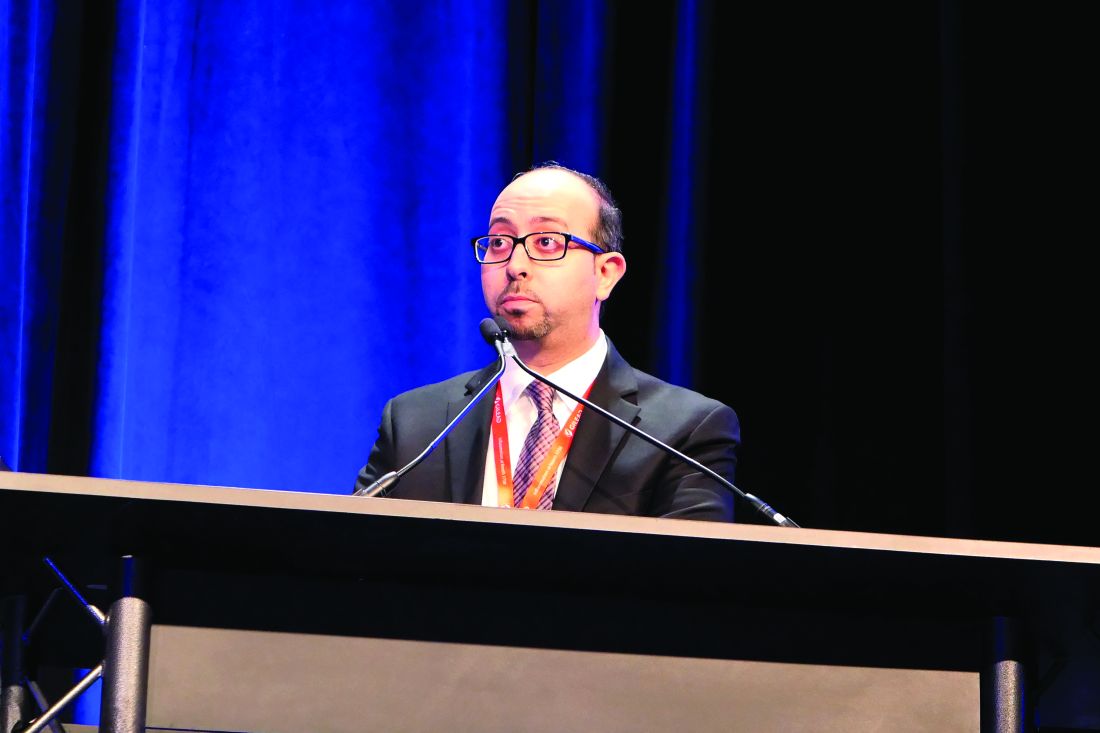User login
SAN ANTONIO – The evidence that statin therapy reduces the risk of developing hepatocellular carcinoma, while not rising to the highest-level 1A strata, is nonetheless sufficiently persuasive at this point that consideration should be given to prescribing a statin in all patients with risk factors for the malignancy, regardless of their cardiovascular risk profile, Muhammad Talal Sarmini, MD, asserted at the annual meeting of the American College of Gastroenterology.
This includes individuals with hepatitis B or C virus infection as well as those with cirrhosis. The jury is still out as to whether nonalcoholic steatohepatitis is a risk factor for hepatocellular carcinoma (HCC), observed Dr. Sarmini of the Cleveland Clinic.
He presented a new meta-analysis, which concluded that patients on statin therapy had a 43% lower risk of new-onset HCC than persons not taking a statin. This meta-analysis – the largest ever addressing the issue – included 20 studies totaling more than 2.6 million patients and 24,341 cases of new-onset HCC. There were 11 retrospective case-control studies, 6 cohort studies, and 3 randomized trials. Five studies were from the United States, nine from Asia, and six were European.
In subgroup analyses aimed at assessing the consistency of the study results across various domains, there was a 45% reduction in the risk of HCC in association with statin therapy in the three studies of patients with hepatitis B virus, and significant reductions as well in Asia, Europe, and the United States when those participants were evaluated separately. The reduction was significant in both the case-control and cohort studies, but not when the three randomized, controlled trials (RCTs) were analyzed collectively. However, Dr. Sarmini shrugged off the neutral RCT results.
“It’s worth noting that the RCTs reported data from patients who were on statins with 4-5 years of follow-up. They were not at high risk for HCC. Given the nature of the disease and the relatively short period of follow-up, these studies only reported 81 cases of HCC. So they were very limited,” he said.
Audience members were eager to learn if Dr. Sarmini had found a differential preventive effect for lipophilic statins, such as atorvastatin or simvastatin, versus hydrophilic statins. He replied that, unfortunately, the published study results don’t allow for such an analysis. However, a large, propensity-matched cohort study published too recently for inclusion in his meta-analysis shed light on this matter. This Swedish national registry study included 16,668 propensity score–matched adults with chronic hepatitis B or C infection, of whom 6,554 initiated lipophilic statin therapy, 1,780 began treatment with a hydrophilic statin, and the rest were statin nonusers. The lipophilic statin users had an adjusted 44% reduction in 10-year HCC risk, compared with nonusers, while hydrophilic statins weren’t associated with a significant preventive effect (Ann Intern Med. 2019 Sep 3;171[5]:318-27).
Dr. Sarmini said that the meta-analysis results, together with the Swedish registry findings, highlight the need for additional well-designed cohort studies and RCTs of statins in populations at high risk for HCC in order to verify the existence of an HCC preventive effect and pinpoint which statins are effective at what dosages.
HCC is the fourth-leading cause of cancer-related mortality globally, accounting for 800,000 deaths annually. And the incidence is rising on a year-by-year basis.
Dr. Sarmini reported having no financial conflicts regarding his study, which was conducted free of commercial support.
SAN ANTONIO – The evidence that statin therapy reduces the risk of developing hepatocellular carcinoma, while not rising to the highest-level 1A strata, is nonetheless sufficiently persuasive at this point that consideration should be given to prescribing a statin in all patients with risk factors for the malignancy, regardless of their cardiovascular risk profile, Muhammad Talal Sarmini, MD, asserted at the annual meeting of the American College of Gastroenterology.
This includes individuals with hepatitis B or C virus infection as well as those with cirrhosis. The jury is still out as to whether nonalcoholic steatohepatitis is a risk factor for hepatocellular carcinoma (HCC), observed Dr. Sarmini of the Cleveland Clinic.
He presented a new meta-analysis, which concluded that patients on statin therapy had a 43% lower risk of new-onset HCC than persons not taking a statin. This meta-analysis – the largest ever addressing the issue – included 20 studies totaling more than 2.6 million patients and 24,341 cases of new-onset HCC. There were 11 retrospective case-control studies, 6 cohort studies, and 3 randomized trials. Five studies were from the United States, nine from Asia, and six were European.
In subgroup analyses aimed at assessing the consistency of the study results across various domains, there was a 45% reduction in the risk of HCC in association with statin therapy in the three studies of patients with hepatitis B virus, and significant reductions as well in Asia, Europe, and the United States when those participants were evaluated separately. The reduction was significant in both the case-control and cohort studies, but not when the three randomized, controlled trials (RCTs) were analyzed collectively. However, Dr. Sarmini shrugged off the neutral RCT results.
“It’s worth noting that the RCTs reported data from patients who were on statins with 4-5 years of follow-up. They were not at high risk for HCC. Given the nature of the disease and the relatively short period of follow-up, these studies only reported 81 cases of HCC. So they were very limited,” he said.
Audience members were eager to learn if Dr. Sarmini had found a differential preventive effect for lipophilic statins, such as atorvastatin or simvastatin, versus hydrophilic statins. He replied that, unfortunately, the published study results don’t allow for such an analysis. However, a large, propensity-matched cohort study published too recently for inclusion in his meta-analysis shed light on this matter. This Swedish national registry study included 16,668 propensity score–matched adults with chronic hepatitis B or C infection, of whom 6,554 initiated lipophilic statin therapy, 1,780 began treatment with a hydrophilic statin, and the rest were statin nonusers. The lipophilic statin users had an adjusted 44% reduction in 10-year HCC risk, compared with nonusers, while hydrophilic statins weren’t associated with a significant preventive effect (Ann Intern Med. 2019 Sep 3;171[5]:318-27).
Dr. Sarmini said that the meta-analysis results, together with the Swedish registry findings, highlight the need for additional well-designed cohort studies and RCTs of statins in populations at high risk for HCC in order to verify the existence of an HCC preventive effect and pinpoint which statins are effective at what dosages.
HCC is the fourth-leading cause of cancer-related mortality globally, accounting for 800,000 deaths annually. And the incidence is rising on a year-by-year basis.
Dr. Sarmini reported having no financial conflicts regarding his study, which was conducted free of commercial support.
SAN ANTONIO – The evidence that statin therapy reduces the risk of developing hepatocellular carcinoma, while not rising to the highest-level 1A strata, is nonetheless sufficiently persuasive at this point that consideration should be given to prescribing a statin in all patients with risk factors for the malignancy, regardless of their cardiovascular risk profile, Muhammad Talal Sarmini, MD, asserted at the annual meeting of the American College of Gastroenterology.
This includes individuals with hepatitis B or C virus infection as well as those with cirrhosis. The jury is still out as to whether nonalcoholic steatohepatitis is a risk factor for hepatocellular carcinoma (HCC), observed Dr. Sarmini of the Cleveland Clinic.
He presented a new meta-analysis, which concluded that patients on statin therapy had a 43% lower risk of new-onset HCC than persons not taking a statin. This meta-analysis – the largest ever addressing the issue – included 20 studies totaling more than 2.6 million patients and 24,341 cases of new-onset HCC. There were 11 retrospective case-control studies, 6 cohort studies, and 3 randomized trials. Five studies were from the United States, nine from Asia, and six were European.
In subgroup analyses aimed at assessing the consistency of the study results across various domains, there was a 45% reduction in the risk of HCC in association with statin therapy in the three studies of patients with hepatitis B virus, and significant reductions as well in Asia, Europe, and the United States when those participants were evaluated separately. The reduction was significant in both the case-control and cohort studies, but not when the three randomized, controlled trials (RCTs) were analyzed collectively. However, Dr. Sarmini shrugged off the neutral RCT results.
“It’s worth noting that the RCTs reported data from patients who were on statins with 4-5 years of follow-up. They were not at high risk for HCC. Given the nature of the disease and the relatively short period of follow-up, these studies only reported 81 cases of HCC. So they were very limited,” he said.
Audience members were eager to learn if Dr. Sarmini had found a differential preventive effect for lipophilic statins, such as atorvastatin or simvastatin, versus hydrophilic statins. He replied that, unfortunately, the published study results don’t allow for such an analysis. However, a large, propensity-matched cohort study published too recently for inclusion in his meta-analysis shed light on this matter. This Swedish national registry study included 16,668 propensity score–matched adults with chronic hepatitis B or C infection, of whom 6,554 initiated lipophilic statin therapy, 1,780 began treatment with a hydrophilic statin, and the rest were statin nonusers. The lipophilic statin users had an adjusted 44% reduction in 10-year HCC risk, compared with nonusers, while hydrophilic statins weren’t associated with a significant preventive effect (Ann Intern Med. 2019 Sep 3;171[5]:318-27).
Dr. Sarmini said that the meta-analysis results, together with the Swedish registry findings, highlight the need for additional well-designed cohort studies and RCTs of statins in populations at high risk for HCC in order to verify the existence of an HCC preventive effect and pinpoint which statins are effective at what dosages.
HCC is the fourth-leading cause of cancer-related mortality globally, accounting for 800,000 deaths annually. And the incidence is rising on a year-by-year basis.
Dr. Sarmini reported having no financial conflicts regarding his study, which was conducted free of commercial support.
REPORTING FROM ACG 2019

